|
|
|
Sort Order |
|
|
|
Items / Page
|
|
|
|
|
|
|
| Srl | Item |
| 1 |
ID:
174329


|
|
|
|
|
| Summary/Abstract |
After a decade of remarkable growth in the early 2000s, UN peacekeeping has entered a period of sharp contraction. This trend has been especially severe for civilian peacekeepers, who play vital though often neglected roles in UN operations: the number of civilian peacekeeper positions has shrunk by 37% since 2010. This article draws on 164 research interviews and the vast Business literature on downsizing to explore the effects of this contraction of the UN’s remaining civilian peacekeepers and the missions that employ them. To conceptualize this impact, the article begins by outlining the contributions a range of civilians – international and national staff, UN Volunteers and contractors – make to UN peacekeeping. Mobilizing insights from Business scholars, it then argues that difficult downsizing processes, high employee commitment, and workforce stratification place UN missions at high risk of ‘downsizing survivor syndrome’: sustained organizational productivity losses due to decreased individual performance and team coherence. The article then confirms empirically that the nature of UN peacekeeping downsizing, job insecurity, and competition among personnel categories pose profound risks to civilian peacekeeper performance and therefore challenge effective mandate implementation. It also highlights that decreased inter-mission mobility due to the contraction of UN peacekeeping overall exacerbates this effect.
|
|
|
|
|
|
|
|
|
|
|
|
|
|
|
|
| 2 |
ID:
151678
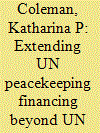

|
|
|
|
|
| Summary/Abstract |
Adequate financing is fundamental to the success of any peace operation. In June 2015, the High-Level Independent Panel on Peace Operations advanced three proposals that would extend UN peacekeeping financing beyond its current boundaries to produce a more comprehensive system of funding peace operations. It advocated giving UN special political missions access to backstopping and transitional funding mechanisms created for peacekeeping operations; providing more predictable financing for UN-mandated African Union–led peace operations; and establishing a single peace operations account to finance all UN peace operations. Yet reforming UN peacekeeping financing is notoriously difficult, not least because of deeply politicized cleavages among member states.
|
|
|
|
|
|
|
|
|
|
|
|
|
|
|
|
| 3 |
ID:
180371
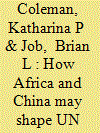

|
|
|
|
|
| Summary/Abstract |
UN peacekeeping became a flagship activity of the liberal international order (LIO) in the post-Cold War era, characterized by globalization, liberal norms and western leadership. Western states' diminished support for LIO UN peacekeeping has left it increasingly open to challenge, but significant changes are only likely if a strong group of states coalesces around an alternative model of UN peacekeeping. This article highlights African actors and China as well positioned to play pivotal roles in such a coalition. African states, who host the preponderance of UN missions and furnish almost half of the UN's uniformed peacekeepers, support globalized UN peacekeeping, show relatively weak support for the most liberal peacebuilding principles and assert the need for African-led solutions to continental crises. China's influence reflects its P5 status, financial and personnel contributions to UN peacekeeping and engagement with regional actors, notably in Africa. Aspiring to global leadership and a ‘new world order’, China endorses globalized UN peacekeeping but proposes a non-liberal (and non-western led) notion of ‘developmental peace’ to guide it. The complementarities between African and Chinese priorities raise the possibility of a profound challenge to LIO peacekeeping. Rather than heralding deglobalization, however, this challenge illustrates that post-LIO international institutions may instead be characterized by deliberalization and dewesternization.
|
|
|
|
|
|
|
|
|
|
|
|
|
|
|
|
| 4 |
ID:
108605
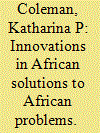

|
|
|
|
|
| Publication |
2011.
|
| Summary/Abstract |
Three critical trends in the evolving practice of regional peacekeeping in sub-Saharan Africa have undermined the usefulness of the common conceptual dichotomy between regional peacekeeping and UN/global peacekeeping. First, sub-Saharan African states have distanced themselves from long-term autonomous regional peacekeeping, and currently favour explicitly interim missions that are a prelude rather than an alternative to UN peacekeeping. Second, the analytically clear line between regional peacekeeping and the separate sub-Saharan African tradition of solidarity deployments (i.e. military support of embattled governments) has in practice become blurred, and the regional vs global peacekeeping dichotomy not only fails to acknowledge this trend but helps to obscure it. Finally, sub-Saharan African states are increasingly addressing regional conflicts by participating in UN operations deployed in the region. UN peacekeeping has thus emerged as a preferred form of regional peacekeeping in sub-Saharan Africa.
|
|
|
|
|
|
|
|
|
|
|
|
|
|
|
|
| 5 |
ID:
078386
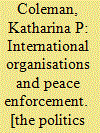

|
|
|
|
|
| Publication |
Cambridge, Cambridge University Press, 2007.
|
| Description |
xii, 360p.
|
| Standard Number |
9780521690348
|
|
|
|
|
|
|
|
|
|
|
|
Copies: C:1/I:0,R:0,Q:0
Circulation
| Accession# | Call# | Current Location | Status | Policy | Location |
| 052541 | 341.584/COL 052541 | Main | On Shelf | General | |
|
|
|
|
| 6 |
ID:
177761
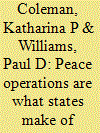

|
|
|
|
|
| Summary/Abstract |
Peace operations are a highly resilient international institution for managing armed conflict. Their resilience derives from what constructivists in International Relations theory call collective intentionality and the malleable constitutive rules that define and structure such missions. Despite a range of current constraints, challenges, and crises, peace operations are unlikely to become extinct unless a critical mass of states consistently withdraw material support for them and explicitly denigrate the concept of peace operations itself. We see little evidence that both these things are likely to occur. However, the constitutive rules guiding peace operations are likely to continue to evolve due to ideational and material changes. While the proliferation of actors and mission types makes precise predictions impossible, we expect an evolution both in how various actors define their own peace operations and how these actors relate to each other.
|
|
|
|
|
|
|
|
|
|
|
|
|
|
|
|
| 7 |
ID:
162454
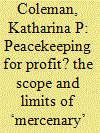

|
|
|
|
|
| Summary/Abstract |
Developing states furnish the vast majority of UN peacekeeping troops, a fact academics and policymakers often attribute (at least partly) to developing states’ supposed ability to derive a profit from UN peacekeeping reimbursements. In this article, we argue that this ‘peacekeeping for profit’ narrative has been vastly overstated. The conditions for significantly profiting from UN peacekeeping are in fact highly restrictive, even for developing states. We begin by highlighting two potent reasons for re-examining the peacekeeping for profit narrative: developing states emerged as the UN’s principal troop contributors in a period of stagnant reimbursement rates when UN peacekeeping was becoming less financially attractive; and the quantitative evidence scholars have presented as supporting the peacekeeping for profit narrative is flawed. We then identify the scope conditions within which peacekeeping for profit provides a plausible explanation for a developing state’s UN troop contributions. First, the deployment and its attendant reimbursements must be significant not only in absolute and per-soldier terms but also in relation to the state’s total armed forces and military expenditure. Second, the state must have an exceptional ability, compared with other troop contributors, to benefit from UN reimbursements. The scope for generalized profit-making from either equipment or personnel contributions is limited by intense political pressure against reimbursement rate increases. Individual states can nevertheless make a profit if they (1) invest in inexpensive and old but functional equipment, especially if deployed with usage restrictions, and/or (2) limit the deployment allowances (rather than salaries) they pay their peacekeepers. We establish that only a limited subset of developing states meets the plausibility conditions for the peacekeeping for profit narrative – and many top UN troop contributors do not.
|
|
|
|
|
|
|
|
|
|
|
|
|
|
|
|
|
|
|
|
|